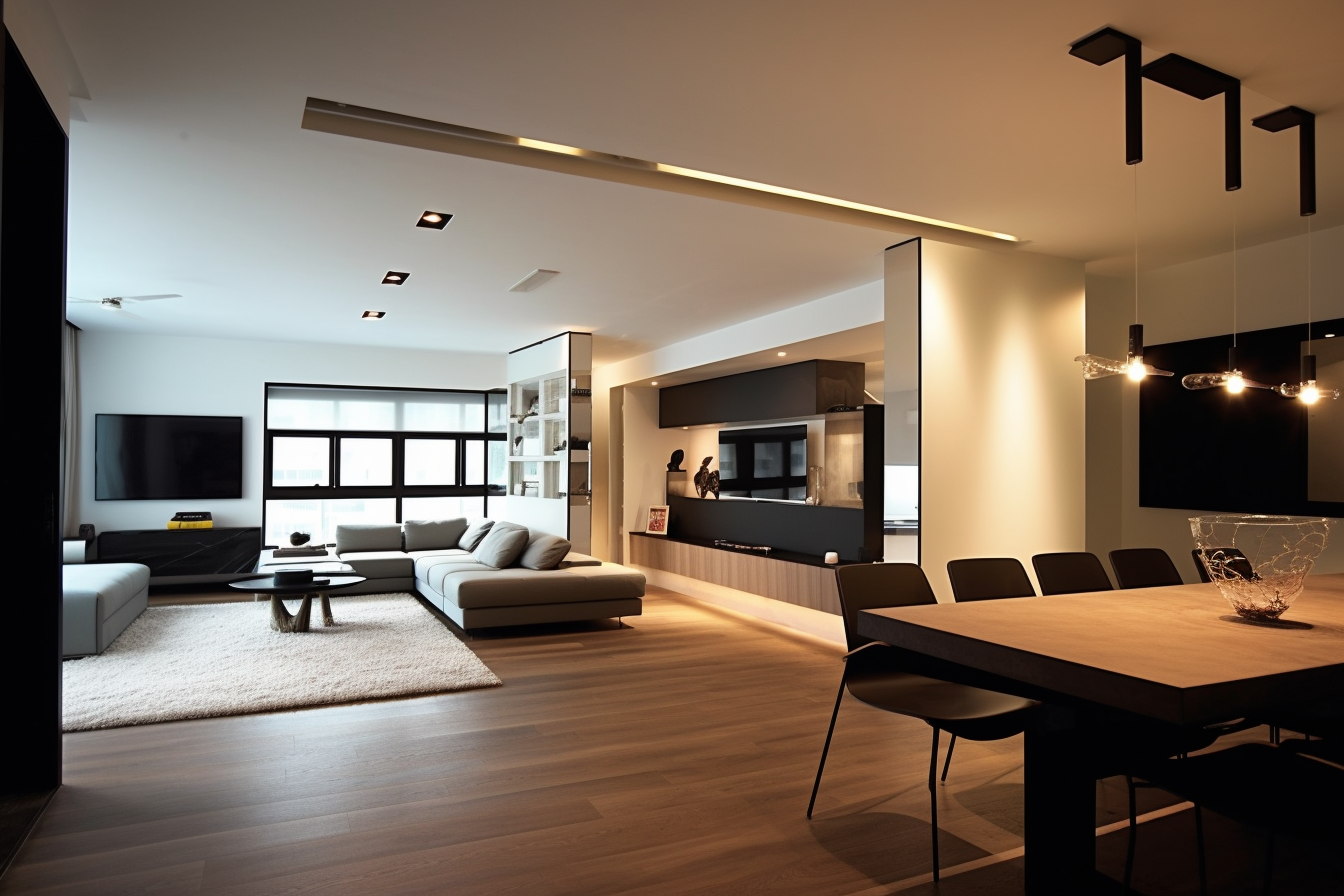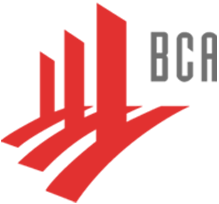The typical cost for home renovation in Singapore hovers at approximately S$45,600. Nevertheless, the precise amount can fluctuate significantly, contingent upon a variety of factors including the residence’s dimensions, the choice of materials, and the desired level of finishing.
Here is a breakdown of the average cost of renovating different parts of a home in Singapore:
Living room: S$6,800
Bedroom: S$7,500
Bathroom: S$2,600
Kitchen: S$11,950
Cost of Renovation
The cost of renovating a home can also be affected by the following factors:
1. The type of renovation
The type of renovation you choose to undertake has a significant impact on the overall cost. Renovations that involve major structural changes, such as knocking down walls or adding new rooms, tend to be more expensive than those limited to cosmetic changes, like painting or replacing flooring. Structural renovations often require extensive labor, materials, and possibly permits, driving up the expenses substantially. In contrast, cosmetic renovations can be more budget-friendly and typically involve less complex work. It’s essential to carefully consider your renovation goals and budget constraints when deciding on the type of renovation that best suits your needs and resources.
2. The quality of the materials
The quality of materials chosen for a renovation project is a key determinant of its overall cost. Opting for high-quality materials often comes with a premium price tag, as these materials are designed to be more durable, aesthetically appealing, and long-lasting. While they may represent a higher upfront cost, their durability can lead to reduced maintenance and replacement expenses over time.
Conversely, selecting lower-quality materials may lower initial expenses but can result in more frequent maintenance and replacement costs, potentially making the renovation more expensive in the long run. Balancing the quality of materials with your budget and the expected lifespan of the renovation is essential to make informed decisions that align with your financial resources and project goals.
3. The labor costs
Labor costs play a significant role in the overall cost of a renovation project in Singapore. The city-state is known for its relatively high labor costs, which can substantially impact the total expense of any construction or renovation work. Skilled labor, including architects, contractors, carpenters, electricians, and plumbers, all command competitive wages in Singapore.
The complexity of the renovation, the skill level required for the work, and the duration of the project will influence the labor costs. It’s essential to obtain multiple quotes from reputable contractors and carefully evaluate their estimates to ensure you are getting a fair price for the labor component of your renovation. Properly budgeting for labor costs is crucial to managing the overall expense of your renovation project effectively.
4. The design of the renovation
The complexity of the renovation design is a significant factor affecting the project’s cost. A more intricate and sophisticated design will typically demand additional time, labor, and resources to execute, thereby increasing the overall cost of the renovation. Complex designs often involve intricate architectural details, custom-made components, and specialized craftsmanship, all of which contribute to higher expenses.
In contrast, simpler and more straightforward renovation designs tend to be more cost-effective, as they involve fewer design elements and are generally quicker to implement. When planning a renovation, it’s crucial to strike a balance between your design aspirations and your budget constraints. Careful consideration of the design complexity can help you manage costs while achieving the desired aesthetic and functionality for your space.
If you are planning to renovate your home, it is important to get quotes from several contractors before making a decision. This will help you to get the best possible price for your renovation.
Tips for reducing the cost of your home renovation
- Do your research. Get quotes from several contractors and compare prices.
- Choose a contractor who is reliable and has a good reputation.
- Be clear about your budget and expectations.
- Be prepared to compromise on some of your design ideas.
- Do some of the work yourself, such as painting or tiling.
- Shop around for materials and get discounts.
Singapore Most Common Home Renovation Issues
In the year 2021, the Consumer Association of Singapore (CASE) received a total of 1,300 complaints filed against renovation contractors, marking a significant 50% increase compared to the previous year.
The most prevalent issues reported included contractors failing to adhere to project timelines and delivering substandard workmanship. Additional common grievances involved undisclosed or hidden costs, inadequate communication, and incidents of property damage.
Several key factors contributed to these home renovation problems:
1. Unrealistic Expectations
Unrealistic expectations are a common challenge in renovation projects. Homeowners may have overly optimistic assumptions about various aspects of the project, including its cost, timeline, and scope of work. This can lead to significant issues during the renovation process. Unrealistic budget expectations may result in financial strain or the need to compromise on materials and finishes. Unrealistic timeline expectations can cause frustration if the project takes longer than anticipated. Unrealistic scope expectations may lead to unforeseen changes or delays.
To address this challenge, it’s crucial for homeowners to thoroughly research and plan their renovation projects, seeking guidance from experienced professionals if necessary. Setting realistic expectations and being prepared for potential setbacks can help ensure a smoother and more successful renovation experience. Clear communication with contractors and a comprehensive understanding of the project’s details are also key factors in managing expectations and achieving desired outcomes.
2. Poor Communication
Poor communication is a prevalent issue in renovation projects, often resulting in misunderstandings and disputes between homeowners and contractors. Clear and effective communication is essential for ensuring that both parties are on the same page regarding project goals, timelines, budgets, and expectations. When communication breaks down, it can lead to:
- Misunderstandings: Lack of clarity in project specifications and requirements can lead to misunderstandings about the work to be done.
- Delays: Poor communication can result in delays as contractors may not have the necessary information or materials on time.
- Budget Overruns: Changes or additions to the project that are not adequately communicated can lead to unexpected costs.
- Frustration and Stress: Miscommunications can cause frustration and stress for both homeowners and contractors, impacting the overall project experience.
To mitigate this challenge, it’s essential for homeowners and contractors to establish clear lines of communication from the outset of the project. Regular meetings, written documentation of project details, and open dialogue can help prevent misunderstandings and ensure a smoother renovation process.
3. Unqualified Contractors
Hiring unqualified contractors is a significant risk in the renovation process, and it can lead to various issues and complications. When homeowners unintentionally select contractors who lack the essential skills and experience needed for the job, it can result in:
- Subpar Workmanship: Inexperienced or unqualified contractors may produce subpar work, leading to costly repairs or redoing portions of the project.
- Delays: Contractors who are unfamiliar with the complexities of the job may encounter delays, prolonging the renovation timeline.
- Safety Concerns: Poorly executed work can pose safety hazards to homeowners and their families.
- Legal and Financial Risks: Contractual disputes and legal issues may arise if the contractor does not meet their obligations.
To avoid this challenge, homeowners should thoroughly vet contractors before hiring them. This includes checking references, verifying licenses and certifications, reviewing past work, and conducting interviews. Investing time in selecting qualified contractors can ultimately save homeowners from costly and frustrating renovation setbacks.
4. Hidden Costs
Hidden costs are a common concern in renovation projects and can catch homeowners off guard. Contractors may not always provide full transparency regarding all financial aspects of the project, which can lead to unexpected expenses and financial burdens. These hidden costs can include:
- Change Orders: Contractors may not adequately communicate potential changes to the project scope, which can result in additional expenses for homeowners.
- Material Costs: Fluctuations in material prices or unexpected material requirements may not be disclosed upfront.
- Permit and Inspection Fees: Hidden fees related to permits and inspections can add to the project’s cost.
- Cleanup and Disposal Costs: The cost of cleaning up and disposing of construction debris may not be included in the initial estimate.
To address this challenge, homeowners should strive for clear and comprehensive contracts with their contractors. Contracts should outline all costs, potential contingencies, and the process for handling changes or unforeseen expenses. Effective communication with contractors and a thorough understanding of the contract terms can help homeowners anticipate and manage hidden costs more effectively.
To preempt these home renovation issues, homeowners can take proactive steps, such as conducting thorough research by obtaining quotes from multiple firms and meticulously checking their references. It’s essential to establish a comprehensive written contract with the chosen contractor, clearly delineating the project’s scope, timeline, and costs.
Maintaining realistic expectations about the project’s budget, timeline, and scope is crucial. Active involvement and regular communication with the contractor throughout the renovation process can also help prevent complications. Finally, vigilant inspection of the work’s progress, coupled with prompt identification and reporting of any issues, is advisable.
Should homeowners encounter challenges during their home renovation, they can seek valuable advice and assistance from CASE.
Factors to Consider Beyond Pricing
Selecting the right interior design firm to transform your home into a haven of comfort and aesthetics is a crucial decision. While pricing is an important factor, it should not be the sole consideration. There are various other vital factors that deserve equal, if not more, attention. This essay explores the essential factors to look for beside pricing when choosing the right interior design firm for your home.
- Portfolio and Style Compatibility
A reputable interior design firm should have a diverse portfolio showcasing their previous work. By examining their portfolio, you can assess whether their design style aligns with your preferences. Every designer has a unique style, and finding one whose work resonates with your vision for your home is essential. - Reputation and Reviews
Investigate the firm’s reputation within the industry and among previous clients. Online reviews and testimonials can offer valuable insights into the quality of their work, their professionalism, and their ability to meet deadlines. Word of mouth recommendations from friends or family members can also be invaluable. - Experience and Expertise
Experience matters in interior design. A firm with years of experience is likely to have encountered and solved various design challenges. They will also have a better understanding of local regulations and building codes, which can be critical for a smooth project. - Communication and Collaboration
Effective communication between you and the design firm is crucial. Ensure that they are open to your ideas and actively listen to your requirements. A collaborative approach ensures that your home reflects your personal taste and lifestyle. - Project Management Skills
Interior design projects can be complex, involving various contractors and suppliers. A proficient design firm should excel in project management, ensuring that timelines are met, and budgets are adhered to. Ask about their project management processes to gauge their efficiency. - Transparency and Budgeting
While pricing is a critical factor, it’s essential to understand the firm’s pricing structure. A transparent breakdown of costs helps you make informed decisions. A good design firm will work within your budget and provide options that align with your financial constraints. - Quality of Materials and Workmanship
Inquire about the quality of materials and workmanship the firm employs. High-quality materials and skilled craftsmanship are essential for a durable and visually pleasing interior. Be cautious of firms that compromise on quality to cut costs. - Flexibility and Adaptability
Interior design projects can evolve, and unforeseen changes may be necessary. A flexible design firm should be able to adapt to these changes without causing significant delays or budget overruns. - References and Site Visits
Request references from the firm and visit their completed projects if possible. This firsthand experience can provide a clear understanding of their work quality and attention to detail. - Legal and Licensing Compliance
Ensure that the interior design firm complies with all necessary licenses and permits required in your area. This ensures that your project is in compliance with local regulations and reduces potential legal issues.
While pricing is undoubtedly a crucial factor when selecting an interior design firm for your home, it is only one piece of the puzzle. By considering these additional factors, such as portfolio compatibility, reputation, experience, communication, project management, transparency, quality, flexibility, references, and legal compliance, you can make a more informed decision.
A comprehensive evaluation of these elements will help you choose the right interior design firm to transform your house into a personalized and visually stunning home that suits your lifestyle and preferences.
By following these tips, you can save money on your home renovation without sacrificing quality.







